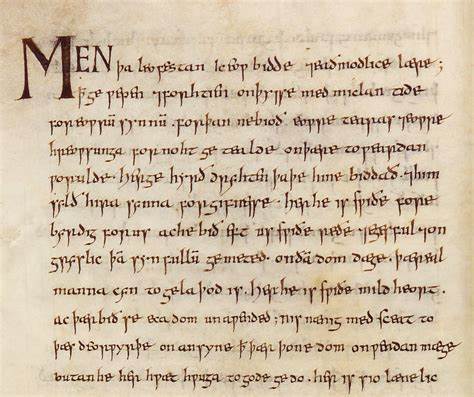Old English Words Worth Starting Using Again
October 12 , 2021Old English Words Worth Starting Using Again
by Target Language Translation Services
- October 12 2021

Language changes over time; words and phrases come and go. Many Old English words have been lost through the ages. Modern English is a world apart from ye olde English that dates back to 1150 CE. But there’s a difference between Shakespear’s Elizabethan English (which came centuries after Old English) and Early Modern English and Old English. In fact, proper Old English was the language spoken by Germanic invaders in Britain before the Norman Conquest of 1066. If someone used accurate Old English today, you probably wouldn’t recognize the language. In many cases, there is a good reason for words leaving our vocabulary. Other old English words, however, still have perfectly valid meanings in our modern world and really need to be brought back, if only for the pleasure of saying them.
Here is an interesting collection of Old English words that might actually deserve some time in the spotlight again!
Vomitorium
Vomitorium is a word that dates back to ancient Rome, and contrary to what it sounds like, a vomitorium wasn’t a particular room used to throw up in. It is a passage by which you can exit a building, usually a theater. They were aptly named thanks to the way people could spew out of buildings by using them.
Crapulous
Crapulous dated back to 1536 and was a most appropriate sounding word for the condition of feeling ill as a result of too much eating/drinking. And we think it’s pretty suitable actually. The word comes from the Latin term crapula, which means "intoxication", and that Latin term was derived from an even older Greek word that was used to describe the headache you get after drinking too much alcohol.
Cockalorum
Cockalorum is a word that is used to describe a small man with a big opinion of himself. The term derives its meaning and imagery from a rooster and might trace back to the obsolete Flemish word "kockeloeren", which means "to crow".
Uhtceare
There is a single Old English word meaning "lying awake worrying before dawn". Uhtceare is not a well-known word even by Old English standards, which were pretty damn low. In fact, there is only one recorded instance of it actually being used. Say it now, like this: oot-key-are-a.
Lanspresado
A lanspresado is (according to a 1736 dictionary of thieves’ slang) "He that comes into company with but two-pence in his pocket." Lanspresados are everywhere. They have usually forgotten their wallets, or having some other complicated story to explain why they don’t have money with them.
Grubbling
It’s time to check whether you’ve got your keys and your phone and your purse or wallet. This is done by grubbling in your pockets. Grubbling means to feel or grope around for something that you can’t see. It is a verb that usually refers to pockets, but can also be used for feeling around in desk drawers that are filled with knick-knacks and whatnot.
Rawgabbit
A rawgabbit, just in case you were wondering, is somebody who likes to gossip confidentially about matters that they know nothing about.
Mugwump
Mugwump is a derogatory word for somebody in charge who affects to be above petty squabbles and factions. So when your boss tries to make peace at the meeting table like an impartial angel, he is being a mugwump. (The Mugwumps were also a group of rebellious Republicans who broke with their party to support the Democratic candidate in the 1884 U.S. presidential election. —Ed.)
Vinomadefied
Once you are properly vinomadefied, all sorts of intriguing things start to happen. Vinomadefied, by the way, does not mean "made mad by wine", but merely dampened by it.
Callipygian
Without sounding crass, you could compliment someone’s butt in style by using the word callipygian, which means that they have shapely buttocks. The term made its way into the English language a little later than the age of Old English, but it’s derived from the ancient Greek word kallipygos, which was first used to describe the statue of Aphrodite showing off her perfect behind.
Conclusion
Old English was a fascinating variation of the modern English we use today, but if you’re not a linguist, it might be difficult to see how and when particular phrases and words were used. On the other hand, we reckon the words we mentioned here hit home and might just deserve being reclaimed and used instead of modern slang!
This article is reprinted from Day Translations, MENTAL FLOSS and Lifehack.
If there is a copyright, please inform us in time, we will delete it right the first time.